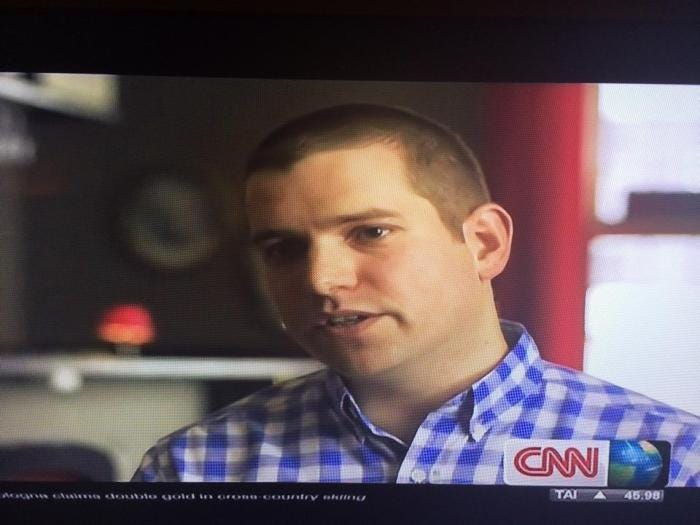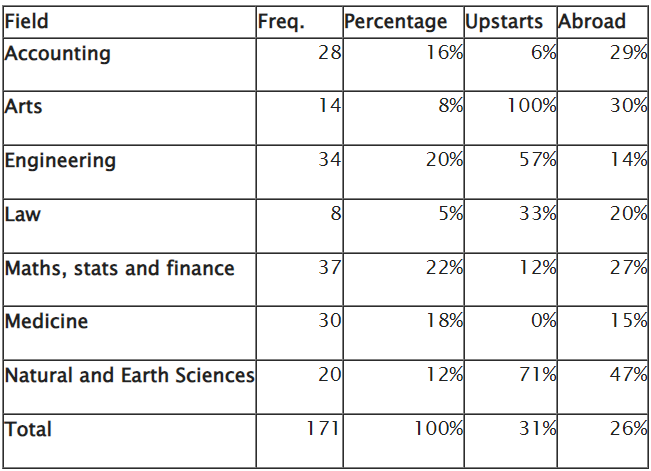Smart people should build things
Because CNN says so: Kobus Ehlers and his team at FireID are building something. Smart People Should Build Things is the title of a new book by Andrew Yang, a serial entrepreneur and founder of Venture for America. Yang shows that most graduates from top US universities become bankers, lawyers, consultants, or doctors in one of the five main metropolitan areas of America: New York, Boston, San Francisco, Los Angeles or Washington D.C. Why is this? Because smart people want to achieve, ‘and that’s what achievement looks like’ in America today. In short, Yang’s story goes like this: The smartest kids go to the top universities, are recruited by the largest corporates and funnelled into fancy offices with high paying salaries where they perform routine, uninventive tasks. The reason they choose this path is because it is the road of least resistance: while it is arduous and challenging to study to be a doctor, or lawyer, or economist, the risk is low if you have a certain academic ability. Jump through the necessary academic hoops, and a high-paying job is assured. To Andrew, this is a bad thing for America. Imagine if Mark Zuckerberg, known to be one of the top students of his generation, had decided to accept a job at a prominent New York consulting firm. Instead he founded Facebook, to the benefit of the American economy (including the consulting firm, who now advises clients to invest in Facebook) and billions of people around the world. And it’s not only the economy that benefits, Yang argues, but also the entrepreneurs themselves; Zuckerberg is not only fabulously wealthy, but he actually enjoys what he’s doing. So is this also true for South Africa? What do South Africa’s top talent choose to study, and what do they end up doing with their lives? Are they building future Facebooks, or accepting cosy jobs in Sandton or Canary Warf? To answer this question, I tracked down the top 20 matric students on the Merit Lists for 2001 to 2010, published by the Western Cape Department of Education. A friend and I could find degrees and current job descriptions on 77% of these students (174 of the 226 students on the list; for several years, the List included the names of more than 20 students). (Incidentally, 115 of these 174 matrics (66%) decided to study at Stellenbosch. The second most popular university is UCT, which attracted 20%. Only one student studied at the other Western Cape university, UWC. 61% of these students are female.) At Harvard in 2011, 29% of graduates went into finance and consulting, 19% into Law School and 18% to medical school. Table 1 shows the choice of the Western Cape’s top talent: similar to Harvard, 18% of students studied to become medical doctors. Far fewer of our top students study Law (5%), while a significantly higher number went into finance and consulting – 36% when we add the two categories of Accounting, and Maths, stats and finance (which is dominated by Actuarial Science).
We should ask the same question of South Africa that Yang asks for America: how many of our best students choose the paths of least resistance? To test this, I also include another variable in Table 1: ‘Upstarts’ show the percentage of students from the various fields that now work in small to medium-sized firms (I only included students that finished school up until 2007). The story is quite clear: those in Math, stats and finance, and in Accounting end up working for big, established corporates: for example, nine former students now work for PwC. It is the engineers (57%) and especially the scientists (71%) that end up working for small, South African start-ups. (Students from the Arts also end up in small firms, although the sample size here is tiny; we could only find information on four individuals.) Students in Engineering and the Natural and Earth Sciences are more likely to start their own thing, or join another small start-up. Unfortunately, many of them do so in foreign countries. ‘Abroad’ denotes the share of students that are situated outside South Africa. Close to half of all the students with a Natural and Earth Sciences degree end up abroad. While some are continuing their studies at top US and British universities and will hopefully return to South Africa, many seem to have relocated permanently. How many of them might be a future Elon Musk? South Africa needs more start-ups if it is to grow the economy. Most innovation (especially transformative innovation, like Facebook or, to use a South African example, Mark Shuttleworth’s Thawte) occurs in small firms, and this is also where most employment is created. And to lead such innovation and job creation we need the sharpest tools in the shed to start or join these young companies. Because it is better for South Africa if our smartest students build their own companies or join young ones, perhaps we should offer them incentives to do so. Stellenbosch University already has excellent facilities for start-ups – the MIH Media Lab, for example, and InnovUS. Many Stellenbosch start-ups are already making their mark on the national and international stage, like digital payments app SnapScan, developed by FireID (a company founded by a top 20 Merit List alumni). But maybe we should do more, and Yang offers a number of suggestions like tax incentives, risk sharing or greater emphasis on graduate recruitment, like his own Venture for America. Of course, we can’t all be innovators, scientists, and entrepreneurs. And not all start-ups will be successful. But what we should do is to create incentives that will reduce the risks for aspiring young innovators to try something new, incentives that will encourage smart kids to join an upstart rather than a corporate conglomerate. South Africa’s GDP – and their happiness – would be much better for it. *A shortened version of this essay appeared in Die Matie, the student newspaper of Stellenbosch University (12 March 2014)



